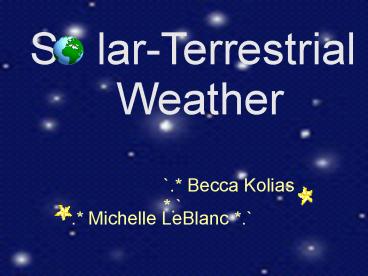S larTerrestrial - PowerPoint PPT Presentation
1 / 11
Title:
S larTerrestrial
Description:
Space weather ... This radiation can come as plasma (particles) or electromagnetic ... only Earth, but also to other bodies: planets, moons, and stars. ... – PowerPoint PPT presentation
Number of Views:17
Avg rating:3.0/5.0
Title: S larTerrestrial
1
S lar-Terrestrial Weather
. Becca Kolias .
. Michelle LeBlanc .
2
What is Space Weather?
Space weather originates on the sun.
Activity on the surface of the sun, such as
solar flares, can cause high levels of radiation
in space. This radiation can come as plasma
(particles) or electromagnetic radiation
(light). -Fairview Highschooler
- Sources of Space Weather
- Solar Flares
- Radiation
- Coronal Mass Ejections
- Interplanetary Shock
- Solar Energetic Particles
- Other Distubances
3
So... Why Should YOU Care?
The magnetosphere protects the earth from the
massive amounts of radiation given off by the sun.
Solar events can disrupt satelite connections
for example, cell phone service may be cut off.
Major solar storms have been known to cause
entire cities to lose power.
On an aesthetic note, solar events cause the
beautiful aurora.
For health reasons... Solar activity produces
radiation that could be harmful to astronauts and
those who fly long distances on a plane.
"Even though we may not realize it, the Sun is
the major driver, not only of Earth's weather,
but also of the electromagnetic activity that can
affect the technical system on which society
depends." -James West
4
The magnetosphere is called the magnetosphere
because it acts much like a magnet.
The magnetosphere is specific to not only Earth,
but also to other bodies planets, moons, and
stars.
Did you know that the Earth's environment
extends all the way from the sun to the Earth and
beyond? It is not an empty wasteland of space.
Instead, near-Earth space is full of streaming
particles, electromagnetic radiation, and
constantly changing electric and magnetic fields.
All of these things make up our magnetosphere.
-Dr. Frank Six
5
Interplanetary Shock
A strong jump from upstream to downstream
electromagnetic fields during which the
properties of the plasma are altered...
Plasma is heated
Density of the plasma increases
Plasma changes its form
Velocity is changed
the velocity of the shock is what we are
researching
6
We researched how an interplanetary shock wave
propagates throughout the Earth's
magnetosphere
We were curious as to whether the interplanetary
shock wave would gain or lose velocity as it
travels from the solar wind and passes through
the bow shock, the magnetopause,
and the magnetosphere.
Global simulations of the Earth's magnetosphere
will be used to examine how an
interplanetary shock interacts with the
magnetosphere
Similar plots could be used to predict when a
spacecraft may come in contact with an
interplanetary shock, so that the electronics of
that spacecraft could be shut down or
protected before being destroyed
7
- Research Process -'
We plotted graphs from computer simulations using
J. Raeder's program.
Each of these graphs shows various data on a
specific point in the simulation.
By comparing these graphs, we were able to
analyze velocity and discover how an
interplanetary shock propagates across the
magnetosphere.
Time
8
D a t a A n a l y s i s
9
The velocity of the disturbance in the
solar wind was less than it was in the
magnetosphere.
As the interplanetary shock reached the bow
shock, the bow shock was at first compressed
towards the earth, and then moved back outwards.
Region (x 1,z 1) (x
2,z 2) Dd Dt
Velocity
10
Interplanetary shocks gather velocity as they
propagate through the magnetosphere.
The bow shock is also influenced by
interplanetary shock waves, moving in at first
towards the magnetosphere, but then bounces back
sunward, with a net Earthward movement
The propagation of interplanetary shock waves is
similar to the domino effect in that the term
'wave' refers more to a chain of events than a
single sweep.
Time
11
Works Cited
Dr. Frank Six. What is Space Weather. MSFC
Space Plasma Physics. Sep. 24, 1996.
lthttp//science.nasa.gov/ssl/pad/sppb/edu/magnet
osphere/bullets.htmlgt NASA. July 19, 2004.
James West. Solar Scientists Prepare for
Storms. USAToday.com 2002
lthttp//www.usatoday.com/weather/solar/ws031600a.h
tmgt March 16, 2000.
Fairview Highschooler. Space Weather FAQ.
Space.com 2004. Imaginova Corp. lthttp//www.space
.com/spacewatch/solar_faq.htmlg1gt NOAA.
Other Intersting Sites of Additional and
Relevant Information
http//www.tycho7.com/Space/solar_weather.htmAbou
t20this20solar20image1
http//www.space.com/spacewatch/aurora_cam.html
http//koronis.sr.unh.edu/jraeder/pub/grl_1997_l_f
ig3.gif
Special Thanks to
Dan Seaton
Jimmy Raeder
John Dorelli
Bernie Vasquez






























